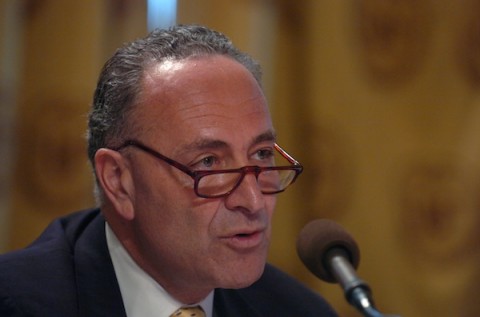Lacking Votes, Dems Press Ahead With DISCLOSE Act
By opposing the popular campaign finance disclosure bill, Senate Republicans risk alienating voters. Or so Democrats hope.
Jul 31, 20202.3K Shares597.8K Views
Sen. Charles Schumer (D-N.Y.) reworked the DISCLOSE Act last week to address Republican concerns. (Bryan Smith/ZUMA Press)
On Monday afternoon, President Obama convened a press conference in the Rose Garden to promote legislation that would counteract the Supreme Court’s Citizens United decision, which held that corporate spending on campaign ads can’t be restricted under the First Amendment. The DISCLOSE Act would require corporations, unions and nonprofit groups to disclose more details about their political advocacy and fundraising. According to Obama, it’s a no-brainer.
[Congress1] “You’d think that reducing corporate and even foreign influence over our elections would not be a partisan issue. But of course, this is Washington in 2010,” he joked. “On issue after issue, we are trying to move America forward, and they keep on trying to take us back.”
With the DISCLOSE Act, which Senate Majority Leader Harry Reid (D-Nev.) scheduled for a cloture vote Tuesday afternoon in the Senate, Obama and fellow Democrats finally feel confident that they’re on solid political ground. The populace might be divided on the merits of the stimulus package, health care reform and the financial regulatory overhaul, but polls showthat 85 percent of Americans worry that corporations have captured too much influence in the political system today and 77 percent think Congress should support measures to limit the amount U.S. corporations can spend to influence elections.
As a result, Democrats are pushing forward with a vote on the bill despite every indication that they won’t reach the 60 votes necessary to break a Republican filibuster. But campaign finance reform groups are confident that even if the bill doesn’t pass, there will be political repercussions for Republican senators who choose to vote against it. And that just might encourage Democrats to keep bringing it to the floor until enough of their colleagues across the aisle change their minds.
After the DISCLOSE Act passed the House last month, good government groups immediately turned their attention to moderate Republicans in the Senate whose support would be necessary to beat a filibuster. They zeroed in on Sen. Scott Brown of Massachusetts, who promised in his Senate campaign to bring greater transparency to Washington, and Sens. Olympia Snowe and Susan Collins of Maine, who have championed campaign finance legislation in the past.
Snowe and Collins, however, have refused to come out in favor of the bill, while Brown openly repudiated it. Collins and Brown, in particular, have argued the bill wasn’t written in good faith because it provided an unfair advantage to unions by exempting funds attributable to dues from the new disclosure rules.
Not to be deterred, Sen. Charles Schumer (D-N.Y.), the bill’s original sponsor, released new languagelast Thursday to address the senators’ concerns. Speaking Monday on a call with reporters, he remained optimistic about getting 60 votes but also keenly aware of the optics of the vote before the August recess.
With the House disclosure exemptions for union dues removed, the bill is now “completely balanced,” Schumer argued. “It will be a true test of many of our Republican colleagues about whether they are in favor of a fair process.”
The senators from Maine, who both voted for the McCain-Feingold campaign finance bill in 2002, are once again the targets of intense lobbying on the part of groups advocating for greater transparency in Washington.
Sen. Ron Wyden (D-Ore.), a DISCLOSE Act co-sponsor who participated on the call, made a special effort to single out Collins for her previous support for “Stand By Your Ad,” campaign finance legislation she partnered with Wyden to sponsor as far back as 1996. And several advocacy groups banded together in Maine to call in and write letters to the two senators’ offices urging them to support the bill.
But democracy and campaign finance reform groups aren’t sure Reid’s rushed schedule will give them time to convince enough senators to vote for the bill — at least not before Tuesday’s vote.
“I don’t know if this time around the Republican offices will have time to digest it all,” said Meredith McGehee, policy directer for the Campaign Legal Center, a nonpartisan organization that works primarily on campaign finance and elections. “Even if not, however, it will jump start the conversation because there’s a lot of misinformation out there.”
Indeed, despite claims from some Republicans that the DISCLOSE Act limits organizations’ First-Amendment right to free speech, Lisa Gilbert, democracy advocate for U.S. Public Interest Research Group, a network of state watchdog organizations, argued that disclosure requirements aren’t just constitutional — they’ve been backed by Republicans many times in the past.
“Republicans have always championed disclosure instead of campaign finance [limits],” she said. “It’s hard at this point to hear a real argument about why they’re opposed to disclosure.”
As a result, even if the DISCLOSE Act doesn’t muster 60 votes on Tuesday, both McGehee and Gilbert predict that Democrats will feel the political wind at their backs and raise the issue again before midterms, most likely in September. Despite the past support from some GOP members for disclosure laws, however, campaign rhetoric from both sides of the aisle is making the bill’s passage all the more divisive.
“I’ve spent a lot of time talking with offices trying to explain the provisions, and once you explain it they’re like, ‘Oh, OK,’” said McGehee. “It’s been that kind of process — hard to get people to focus on the details when there’s been so much focus on the politics and the optics of it all.”

Hajra Shannon
Reviewer
Latest Articles
Popular Articles
